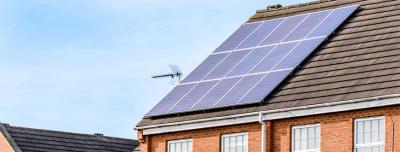Government Propose VAT Increase on Solar Panels

The UK government has declared that we are facing a climate crisis, but in a somewhat contradictory move, is simultaneously proposing a higher rate of VAT on solar panels of 20%. Experts say the move could set decarbonisation of the UK back by years and is "entirely uneconomical".
The consultation by HM Revenue & Customs closed in early May and proposed an increase in VAT from 5% to 20% on renewable materials, including solar panels and batteries. This would make solar panels more expensive and, potentially, deter homeowners from investing.
In addition, the closure of the financial incentive of the Feed-in Tariff in March 2019 means that homeowners choosing to install solar panels do not currently receive any payments for the energy they send to the grid. The Feed-in Tariff may be replaced by a similar scheme called the Smart Export Guarantee, but this is yet to be confirmed.
The new system is designed to be more adaptive to the needs of the grid, and this will supposedly be reflected in payments to those generating excess power. If solar panel installation slows, the UK's target of reaching net zero fossil fuel emissions by 2050 seems unattainable.
Speaking to the Independent, Sian Berry, co-leader of the Green Party said: "A climate emergency has been officially declared, yet we could not have had a clearer sign that the government has failed to even begin to grasp the urgency. Renewables, with energy conservation, are the future, yet once again the government is knocking them back.
"The suppliers, including many small independent companies in communities around the country, have been buffeted by the sudden removal of the feed-in tariff and by the end of export tariff. Again the Conservative government is choosing to privilege big, polluting energy producers over small, clean businesses."
The Renewable Energy Association (REA) describes the news as a "shock" as the government had consulted them in 2015/16 and, as a result, the rates were supposedly finalised at 5%. According to the REA the higher rates would put the UK at a "strategic disadvantage for attracting investment and transitioning its energy system, effectively adding 15% to the cost of most new projects' equipment and penalising consumers who wish to reduce their carbon footprint."
The REA's head of policy, Frank Gordon, said: "The proposed VAT rate hike hits the small-scale renewable energy industry hard during an already difficult landscape. This change risks setting back the UK decarbonisation of homes and businesses in the UK by a number of years.
"Despite recent mass climate-related protests and the UK parliament declaring a climate emergency, the government is again erecting a barrier to cutting emissions and increasing the costs for households who want to help. They are also failing to recognise the cumulative impact of withdrawing as many as 18 policy mechanisms that supported renewable energy deployment since 2015, which could leave the UK trailing behind on decarbonisation and clean growth."
"The REA hopes that government will listen to our recommendations, reconsider and address this issue urgently to utilise the hard work businesses have been engaged in to drive down the costs of solar and energy storage."
The REA will contest the HMRC proposal but, if made official, the new VAT rates would come into effect from 1st October 2019.
Find local, MSC certified Solar Installers
Start your quote
Find local, MSC certified Solar Installers














